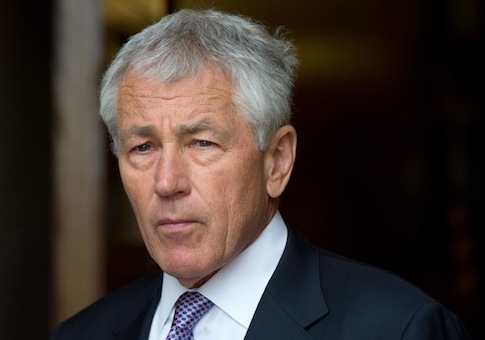The United States remains fully committed to helping Syrian rebels topple the embattled regime of Syrian President Bashar al-Assad, Secretary of Defense Chuck Hagel said Thursday evening.
"Using the full range of tools, the United States will continue to work toward achieving our goal of ending the violence and helping the Syrian people transition to a post-Assad authority," Hagel said during the Washington Institute for Near East Policy’s Soref Symposium, an annual Washington, D.C., gathering that focuses on tracking unrest in the Middle East.
Hagel stopped short of saying the U.S. would commit military forces. However, he said the Obama administration will not permit Assad to continue killing citizens.
Toppling Assad "will help restore stability, peace, and hope for all Syrian people," Hagel said, according to his prepared remarks. "That goal is shared by our allies in the region—not only those bordering Syria, but also our partners in the Gulf."
Hagel warned that the longer the conflict drags on, the more likely extremist jihadis are to gain a foothold in the country.
"As you all know, the conflict in Syria is intensifying and becoming more sectarian," he said. "The possibilities of state fragmentation are increasing, as are the risks of extremism and proliferation."
While the Obama administration has been sharply criticized for not providing weaponry to the Syrian opposition, Hagel maintained it is "leading the international community in organizing and applying sanctions."
The United States is the single largest provider of humanitarian aid in Syria, committing nearly $510 million to date, Hagel said.
"We have given non-lethal assistance to the Syrian opposition, including the armed opposition, and that support is growing," he said. "The U.S. military has been very involved in delivering those supplies. We are also urging Russia and China to do more to help resolve this conflict, because it is also in their interests to end the war."
Hagel went on to discuss the multiple regional challenges the United States faces in combatting extremism and maintaining close relationships with a region in flux.
"The old order in the Middle East is disappearing, and what will replace it remains unknown," Hagel said. "There will continue to be instability in the region as this process plays out, and we all must adjust accordingly."
Hagel said, "The best hope for long-term stability relies on countries like Egypt, Libya, and Syria making transitions to democratic rule."
Hagel also discussed the details of two wide-ranging arms deals the United States recently signed with Saudi Arabia and the United Arab Emirates.
"While in Saudi Arabia and the UAE, I finalized agreements to provide their Air Forces with access to significant new capabilities," he said.
Saudi Arabia, for instance, will be given "84 Boeing F-15SA fighter aircraft," Hagel
The United Arab Emirates will "purchase … 25 F-16 Desert Falcons, which will further enhance their ability to participate in coalition operations such as Libya and Afghanistan, where they have made important contributions," Hagel said.
Iran also remains a top U.S. concern in the region.
The Defense Department has recently moved "high-end air, missile defense, and naval assets" to the Persian Gulf in order to "deter Iranian aggression and respond to other contingencies," Hagel said.
The defense secretary also warned that while terror groups such as al Qaeda may be declining in strength, other radical groups are quickly taking its place.
"Al Qaeda has been substantially weakened in recent years," but "affiliated terrorist groups like the al-Nusra Front are seeking new footholds in the region," Hagel said.
He also discussed his recent trip to Israel, where the United States and the Jewish state cemented news arms deals.
"One of the core principles of U.S.-Israel security cooperation is America’s commitment to maintain Israel’s qualitative military edge—its capacity to defeat any threat or combination of threats from state or non-state actors," Hagel said.
"Beyond rocket and missile defense cooperation, DoD has been working for more than a year to increase Israel’s ability to confront and respond to a range of other threats," he explained.
The United States agreed last month to give Israel a slew of new weapons that will help it combat the threat from Iran and other hostile nations.
These include "anti-radiation missiles and more effective radars for its fleet of fighter jets, KC-135 refueling aircraft, and the V-22 Osprey," Hagel said. "Along with Israel’s status as the only Middle Eastern nation participating in the Joint Strike Fighter program, this new capabilities package will significantly upgrade their qualitative military edge."
Hagel also praised Egypt’s Muslim Brotherhood just hours after opposition leaders and other experts slammed the group for shirking its democratic responsibilities.
"Among the most important of these relationships [in the Middle East] is our defense partnership with Egypt," Hagel said, noting that the Defense Department is working directly "with the Egyptians to help them improve their capabilities to deal with these challenges, and counter terrorism."
Hagel affirmed "America’s continued commitment to our strategic partnership" during recent meetings with Egyptian President Mohamed Morsi and other senior government figures.
He also expressed "continued desire to work together to achieve common security objectives."
"As President Morsi and the Egyptian government work to implement political and economic reform, they will find a strong partner in the United States," Hagel said.
